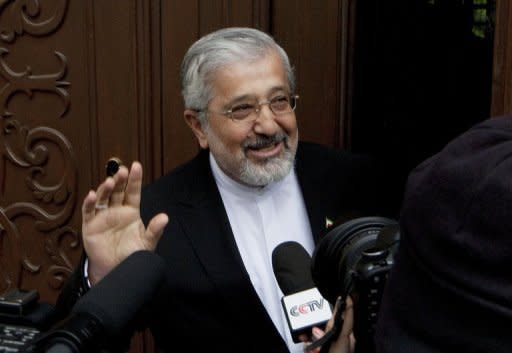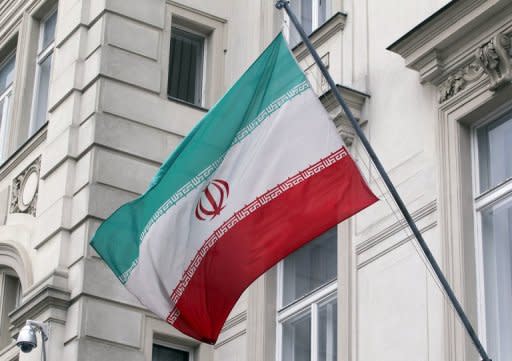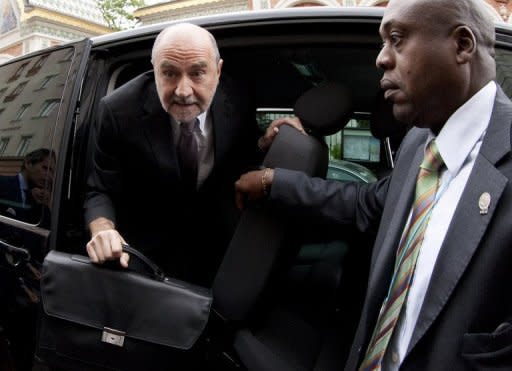UN nuclear watchdog demands Iran cooperation
The UN nuclear agency pressed Iran on Monday for access to "people, documents, information and sites," in talks closely followed by world powers for insights into Tehran's tactics next week in Baghdad. President Mahmoud Ahmadinejad upped the ante in Tehran meanwhile, urging the West to "correct its manners" and declaring once again that the Islamic republic would not retreat from its "fundamental right" to a peaceful nuclear programme. "We are here to continue our dialogue with Iran in a positive spirit," International Atomic Energy Agency chief inspector Hermann Nackaerts said as he went into two days of talks with Iran's envoy, Ali Asghar Soltanieh. "It is important now that we can engage on the substance of these issues and that Iran let us have access to people, documents, information and sites," he told reporters in Vienna. In particular Nackaerts wants Iran to address claims made in an extensive IAEA report in November that at least until 2003, and possibly since, there were activities which could only conceivably be aimed at developing the bomb. He also wants access to the Parchin military base near Tehran where the IAEA report -- which cited foreign intelligence, its own sources and Iranian information -- said Iran had conducted explosives tests in a metal container. An IAEA spokesman told AFP that the talks had finished for the day and would resume on Tuesday. He gave no details on what progress, if any, was made. In two visits to Tehran in January and February, branded a "failure" by Washington, the IAEA said Iran denied Nackaerts access to Parchin and dismissed out of hand the claims made in the report as based on forgeries. IAEA chief Yukiya Amano said earlier this month that access to Parchin was a "priority." In March, he already said "activities" spotted by satellite there "makes us believe that going there sooner is better than later." Western countries accuse Iran of removing evidence, but Soltanieh said in March that any allegations of "sanitization" of the site were "a childish (and) ridiculous story made out of nothing." Iran, which disputed the IAEA's version of events during the two visits, says that since no nuclear activities took place at Parchin, it is under no obligation to allow the IAEA in. It has said it would allow access to Parchin but only as part of a broader agreement on "modalities" for future cooperation. Since February, hopes have emerged that perhaps feeling the pressure from new US and EU sanctions due to bite from mid-2012, Iran's approach has changed. Iran and the P5+1 -- Britain, China, France, Russia and the United States plus Germany -- held their first talks in 15 months in Istanbul in mid-April, and agreed to more in-depth discussions in Baghdad on May 23. The talks in Vienna could give early clues on whether the good atmosphere seen in Turkey will continue in Iraq, where the P5+1 want to get down to the nuts and bolts of the almost decade-old dispute over Iran's nuclear programme. Any signs that Iran is using cooperation with the IAEA as a "bargaining chip" would however "get the Baghdad discussions off to a bad start," analyst Mark Fitzpatrick of the International Institute for Strategic Studies in London said. A Western diplomat cautioned too that "success in the Iran-IAEA track doesn't necessarily predict success for the P5+1 and Iran, and failure in one area doesn't necessarily predict failure in the other." Most worrying to the P5+1 is Iranian enrichment of uranium to purities of 20 percent, most notably at the Fordo site inside a mountain near the holy city of Qom. Uranium enriched to 90 percent can be used in a nuclear bomb. Tehran says it wants international acceptance of its right to peaceful nuclear activities, for sanctions to be lifted and for the threat of US and Israeli military action to disappear. Iran's top negotiator, Saeed Jalili, was quoted Sunday as saying that Tehran was "awaiting actions to secure the Iranian people's trust" in Baghdad. And on the day of the talks, Iran will launch an experimental observation satellite, the official IRNA news agency reported on Monday, in what will likely stoke Western fears about its long-range ballistic missile capabilities.




